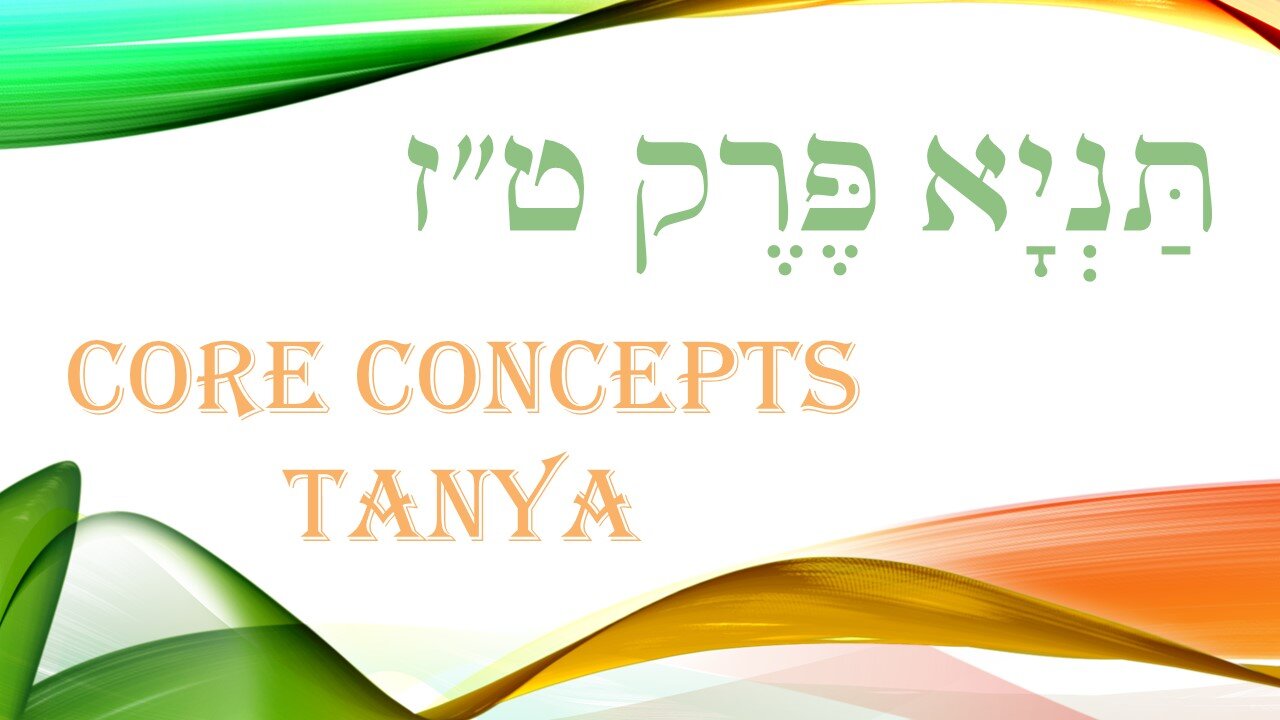Premium Only Content

Core Concepts Tanya: Chapter 16
Brief Recap of Chapter 16:
1. Chapter 16 returns to the recurring theme of "mind over heart," then it takes it to a new level.
We've spoken before of how important it is for us to train ourselves to say no to our impulses and natural desires. Whether or not there is something inherently evil about them, the point is that we should not be controlled by our bodies but by our intellects.
If we must, must give in to a desire whenever it pops up, then not only does that show a loss of control, but it also means we're probably not being the best we can be.
2. One of the ways the Beinoni, and us, exert control is by using our minds to conquer our hearts.
Not only that, but we also want to ignite feelings in our hearts toward Torah and mitzvot, because this will urge us to fulfill them.
Why so much emphasis on the heart, an organ of flesh and blood?
Because the heart is capable of reaching every part of the body. If we can get it on our side, then it will help us bring the rest of the body along.
Think of how animated someone gets when they talk about something they really care about, or how someone wants to laugh and dance and sing when they’re happy.
The more deeply we feel about something, the more we'll want to express it in the physical.
Armed with study, the Beinoni engages in deep and meaningful contemplation, not to clear his mind but to focus it on a specific, Divine topic.
If all goes well, then after many hours and days he will create an emotional response, either love or fear or both.
3. But what if he doesn't?
What if after hours of study and contemplation, he's fully convinced on an intellectual level, but doesn't necessarily feel any deep rooted or fiery emotion? He knows he should, but it’s lodged somewhere in his heart and doesn’t materialize.
The Alter Rebbe calls this ahavah “tevunah," intellectual emotions.
Some people, because of the source of their soul, may not be able to ignite a fiery passion for a particular practice, despite their greatest efforts to achieve it.
They know it's right, they think about it a lot, but their hearts are kind of quiet on the matter.
Now what?
4. "A good thought, Hashem connects to deed."
If we really want to fulfill a mitzvah, but despite our best efforts we can't ignite our emotions to give it that extra bit of life and animation, then Hashem connects our intellectual emotions to the mitzvah and considers it as if we did the mitzvah in the best possible way.
5. Why are emotions, like love and fear, important in fulfilling a mitzvah?
A mitzvah is like a bird, and love and fear are the wings that allow it to fly to higher spiritual realms.
If we do a mitzvah in a lackluster or less than perfect way, we still get credit for the mitzvah, but we haven't really allowed it to reach maximum potential.
When we do a mitzvah because we love (or fear) Hashem so much and because we are in such awe of Him, then we give it wings to soar to higher spiritual levels.
In short, this chapter addresses those who sometimes have a hard time igniting their emotions in regard to Torah and mitzvot, even though they're wholly convinced on an intellectual level.
The Alter Rebbe assures us that this person's Torah and mitzvot not only count, but can also reach great spiritual heights.
-
 12:20
12:20
SLS - Street League Skateboarding
4 hours agoYuto Horigome's Top Moments of 2024! All The 9's 🔥
21.6K -
 1:26:52
1:26:52
The Officer Tatum
3 hours agoLIVE: Leftists RAGE As Trump HALTS Aid to Ukraine + More | Officer Tatum Show Ep 72
51.3K17 -
 1:59:43
1:59:43
The Charlie Kirk Show
4 hours agoTariffs and Trade Wars + Peace in Ukraine? + SOTU Preview | Carney, Schweizer | 3.4.25
91.5K19 -
 43:54
43:54
Ben Shapiro
4 hours agoEp. 2150 - Trump’s STATE OF THE UNION Pledge
61.6K21 -
 1:26:36
1:26:36
Russell Brand
5 hours agoZelensky’s Misstep: Why It Backfired & What Comes Next – SF547
119K32 -
 56:23
56:23
The Dan Bongino Show
7 hours agoThe Momentum Keeps Shifting (Ep. 2435) - 03/04/2025
737K1.13K -
 1:53:44
1:53:44
Benny Johnson
5 hours ago🚨Trump Attorney General Drops a New ‘TRUCKLOAD’ of Epstein Evidence | Kash FIRES FBI Head, Cover-Up
130K224 -
 59:30
59:30
The Rubin Report
5 hours agoMarco Rubio Destroys CNN Host’s Narrative with Facts in Only 1 Minute
106K83 -
 2:04:21
2:04:21
Steven Crowder
7 hours agoWhat Are Pam Bondi's Real Motivations? What It Means For The Epstein Files
509K338 -
 2:03:49
2:03:49
LFA TV
20 hours agoTARIFFS HAVE BEGUN! | LIVE FROM AMERICA 3.4.25 11AM
94.3K38